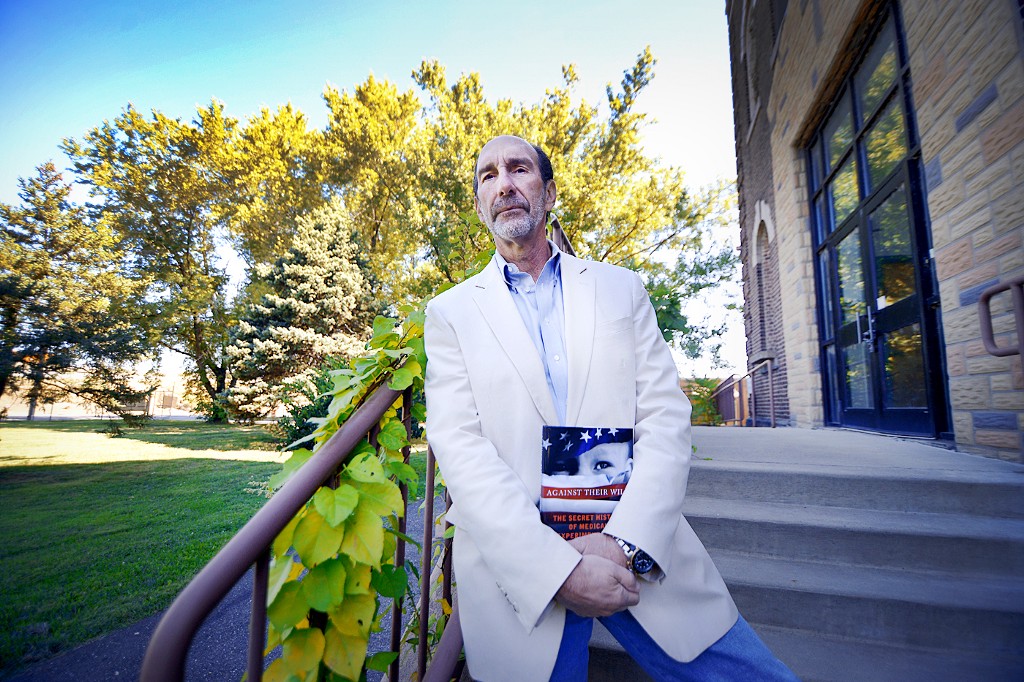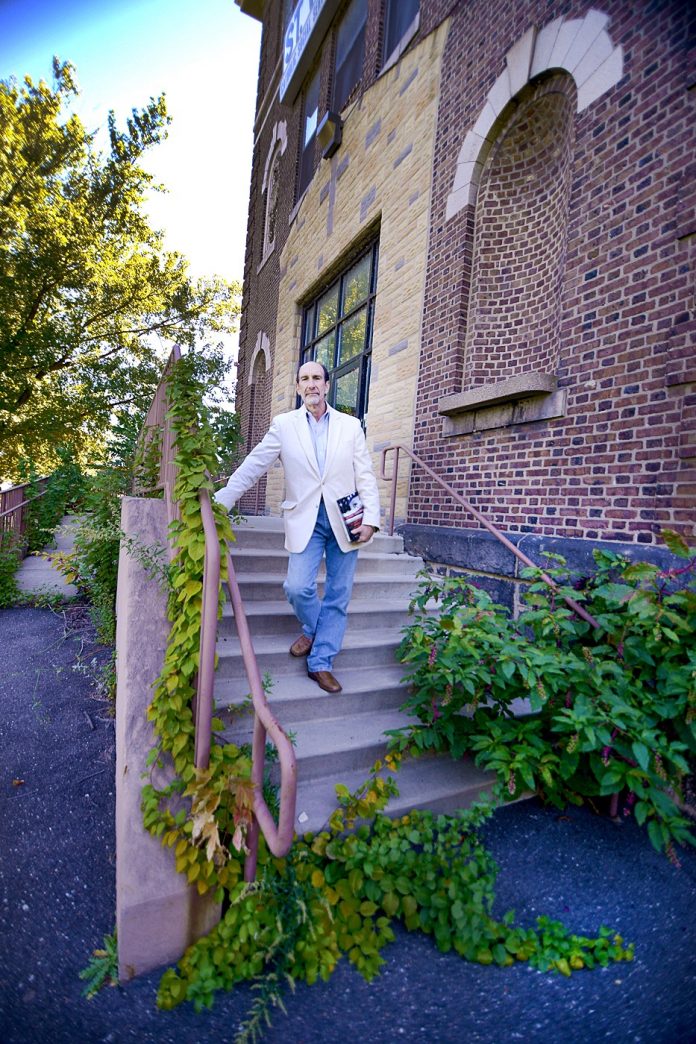History meets horror: Allen M. Hornblum, who wrote Against Their Will with two co-authors, stands in front of St. Vincent’s Home for Orphans in Tacony. In 1907, more than 100 children were used for diagnostic tests at the facility. MARIA POUCHNIKOVA / TIMES PHOTOS
In 1947, the world watched as 23 German doctors were put on trial for monstrous medical experiments on human beings during World War II. They were found guilty of torturing concentration camp prisoners by immersing them in icy water, injecting them with plague, placing them in vacuum chambers and forcing them to swallow seawater.
Seven of the doctors were sentenced to hang; others got long prison terms; and Americans were horrified by their crimes.
They just didn’t know, or perhaps just didn’t care, that doctors right here in the United States also were using unwitting “volunteers” in their quests for wonder drugs and miracle cures, injecting them with diseases, tainting their food and exposing them to illnesses.
Their test subjects were children. Doctors had been experimenting on them for decades — not so much in secrecy, but very much out of public view.
That’s the assertion in Against Their Will: The Secret History of Medical Experimentation on Children in Cold War America, a new book by Northeast Philadelphia resident Allen M. Hornblum and two co-authors, Penn State professor Judith L. Newman and medical issues writer Gregory J. Dober. We saw evil abroad, but not at home, they wrote.
“Few, if any, would contemplate why we so clearly saw a multitude of vices occurring in Nazi Germany’s medical establishment during the 1940s, but turned a blind eye to our own sins in the use of vulnerable populations as test subjects,” they reported.
Against Their Will, published June 25 by Palgrave Macmillan, is part history and part horror story. It’s a story that’s well-told, but in no way pleasant.
“It outrages me,” Hornblum said during an Aug. 22 phone interview.
It’s shocking to find out just how low doctors would go. Even some of the saints of modern medicine used children as test subjects, the authors wrote. And they used kids isolated in institutions because of physical or mental handicaps.
Why them?
Simply because they were isolated from society. They were convenient, available and cheap. And, most important, not many people seemed to care about them.
“Doctors had discovered a use for those locked away in state institutions,” the authors wrote. “Children — mute, unwitting and desperate for affection — would increasingly become the front-line troops in the medical community’s quest to improve the world.”
VILE ACTS
Against Their Will contains chapter after chapter of accounts of experimentation on children.
For example, at the Catholic-run St. Vincent’s Home for Orphans in Tacony, more than 100 children younger than 8 years old were used in 1907 for a series of diagnostic tests in which a tuberculin formula was placed in their eyes. Walter Reed, the doctor famous for tracing yellow fever to mosquitos, used children in New York orphanages to study smallpox vaccines.
And Jonas Salk used kids in Pennsylvania institutions to test polio vaccine.
“Salk was working for years to prevent polio,” Hornblum said Aug. 22. “He needed a test population.”
He found it in “institutions perceived to hold damaged and defective humans,” Hornblum said. “If you were going to do something that was risky … you do it on people who are thought to have less value … so that you, the investigator, were less likely to face negative comment … and less likely to face a lawsuit.”
Besides, Hornblum said, “kids in orphanages have no rights.”
Such practices went on all over the country and were well-known in the medical community, the authors stated. Few doctors spoke out against the practice.
This isn’t Hornblum’s first exposé of the excesses of medical research. In Acres of Skin, the Oxford Circle resident examined how Holmesburg Prison inmates were used in experiments.
Hornblum said he found “stunning” the public’s outrage over the Jerry Sandusky trial, in which the former assistant Penn State football coach was convicted of sexually abusing children, “as I was writing a book about most of the 20th century in which children were being used and abused.”
They were considered society’s flotsam and jetsam and “no one really gave a damn about them.”
Experimentation on children was mentioned in medical journal articles, Hornblum said. “Doctors did read about it and were not disturbed or bothered by it. … It was the culture of research.”
In the early 20th century, Hornblum said, acceptance of medical experimentation on institutionalized children was the result of a mix of public glorification of doctors and their research, about bettering mankind and the belief that mentally handicapped people were a burden society should not have to bear.
“I opened the book with this perfect storm that developed,” Hornblum said.
In the early part of the last century, books were lionizing doctors for their successes against disease, he said. Then there was eugenics, a theory developed in the late 19th century that humanity could be scientifically shaped by controlling breeding and cutting out bad traits — like mental and physical handicaps.
“On one hand, we were glorifying doctors who needed test subjects and would be doing very nasty things to people,” Hornblum said.
On the other hand, those with those handicaps were devalued and dehumanized, Hornblum said. They were people who had no connection to their communities and were considered an onus.
Putting them together “was an arrangement that proved helpful to research,” he said.
The irony is that the Nazi doctors were practicing eugenics, a theory developed by American doctors, Hornblum said. “Eugenics fit in well with the Nazis,” Hornblum said. “They wiped out millions of people.”
Fear also played a role. As the Atomic Age dawned, dread of nuclear war and its aftermath prompted medical experiments in which subjects were exposed to or injected with radioactive material.
The first example the authors cite is that of an institutionalized boy named Charlie Dyer who was offered the opportunity to join the “Science Club” at the Fernald State School in Massachusetts. In the 1950s, Dyer and other boys were offered incentives like special outings to join. But the perks proved few and far between, and Dyer later learned that he and the others were part of secret radiation experiments. Their oatmeal breakfasts were tainted with radioisotope-laced milk.
During the last 25 years of the 20th century, experiments were subjects to institutional oversight and review committees. As doctors, institutions and pharmaceutical companies became more aware of ethical constraints and restrictive codes, the authors wrote, abuses were reduced, but not eliminated in the United States.
Hornblum said he wouldn’t call drug companies evil, “but they are primarily motivated by profit. … It is important from a corporate perspective to develop new drugs … I will not argue that it is an inexpensive process … [drug companies] look for the quickest and cheapest and easiest ways to develop their lines of goods.”
So experimental subjects are still needed, and the profit incentive in finding cheap subjects moved testing overseas. The authors said 80 percent of all drug approvals are based in part on research data accumulated outside the United States.
“It’s cheaper to do research abroad,” they wrote, “where it is easier to recruit test subjects — many of them incorrectly believing they are being treated — and where there is less likelihood that negatively impacted individuals will seek legal counsel.”
And so, experimentation on vulnerable human subjects continues.
“Scientific progress and the medical advances it fosters is a process we can all celebrate,” Hornblum, Newman and Dober wrote, “but the attainment of such triumphs on the backs of children and other powerless groups makes their realization all the less impressive and praiseworthy.” ••
The write stuff
Allen M. Hornblum and Judith Newman, two of the co-authors of Against Their Will, will discuss medical research ethics at 7 p.m. on Wednesday, Sept. 25, at Lubert Commons Penn State’s Abington Campus, 1600 Woodland Ave. The authors’ guests will include Jonathan Marks, a bioethicist and former director of the Rock Ethics Institute; Gordon Shattuck, a former child test subject; and Karen Alves, sister of a test subject. For more information, visit www.hornblum.com

History meets horror: Allen M. Hornblum, who wrote Against Their Will with two co-authors, stands in front of St. Vincent’s Home for Orphans in Tacony. In 1907, more than 100 children were used for diagnostic tests at the facility. MARIA POUCHNIKOVA / TIMES PHOTOS





